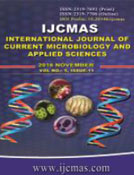


 National Academy of Agricultural Sciences (NAAS)
National Academy of Agricultural Sciences (NAAS)

|
PRINT ISSN : 2319-7692
Online ISSN : 2319-7706 Issues : 12 per year Publisher : Excellent Publishers Email : editorijcmas@gmail.com / submit@ijcmas.com Editor-in-chief: Dr.M.Prakash Index Copernicus ICV 2018: 95.39 NAAS RATING 2020: 5.38 |
This study explored several features related to salt tolerance in mungbean plants through plant growth promoting bacteria (PGPB) Pseudomonas simiae strain AU. We report the significant effect of 1-aminocyclopropane- 1-carboxylate deaminase on the physical parameters and biomass content of Vigna radiata as compared control seedling under salt stress. Control (plants devoid of bacterial strains) and PGPB inoculated mungbean plants were grown in soil: peat (1:1) subjected with saline and non-saline conditions. Results showed that PGPB inoculated plants had superior ability to tolerance against salt stress, as exposed by their enhanced plant biomass (Fresh weight), higher water content, higher photosynthesis activity and lower osmotic stress injury (Table 2). The increased proline accumulation in PGPB inoculated plants root contributed to increased plant tolerance to salt stress (Fig. 1). These results suggest that, in PGPB-inoculation plays a role in mitigate the adverse effect of salt stress. Furthermore, enhanced proline maintain an osmotic balance to keep a positive water potential for water entrance into the roots and reduce oxidative damage by lowering reactive oxygen species level under salt stress condition. Our results indicate that Pseudomonas simiae strain AU is multifunctional PGPB strains that can promote plant growth, development and reduce salinity stress by decreasing the stress ethylene level.
 |
 |
 |
 |
 |